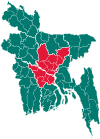Nagarkanda Upazila
Nagarkanda
নগরকান্দা | |
|---|---|
 | |
| Coordinates: 23°24.9′N 89°53.5′E / 23.4150°N 89.8917°E | |
| Country | |
| Division | Dhaka |
| District | Faridpur |
| Area | |
• Total | 192.20 km2 (74.21 sq mi) |
| Population | |
• Total | 222,938 |
| • Density | 1,200/km2 (3,000/sq mi) |
| Time zone | UTC+6 (BST) |
| Postal code | 7840[2] |
| Area code | 06327[3] |
| Website | nagarkanda |
Nagarkanda (Bengali: নগরকান্দা) is an upazila of Faridpur District in the Division of Dhaka, Bangladesh.[4]
In this upazila, in the village of Kodalia, the Pakistani Army killed at least 22 people including women and children on 1 June 1971. The incident is also recorded on film.
Geography
[edit]Nagarkanda is located at 23°24′55″N 89°53′30″E / 23.4153°N 89.8917°E. It has 42,904 households and a total area of 192.20 km2.
Demographics
[edit]As of the 2011 Census of Bangladesh, Nagarkanda upazila had 42,904 households and a population of 197,898. 48,422 (24.47%) were under 10 years of age. Nagarkanda had an average literacy rate of 46.79%, compared to the national average of 51.8%, and a sex ratio of 1013 females per 1000 males. 15,805 (7.99%) of the population lived in urban areas.[6][7]
According to the 1991 Bangladesh census, Nagarkanda had a population of 267, 193. Males constituted 50.18% of the population, and females 49.82%. The population aged 18 or over was 131, 533. Nagarkanda had an average literacy rate of 22.6% (7+ years), against the national average of 32.4%.[8] Most of the people depends on cultivation of land. Rice, Jute, Onion are the main crops. Onion of this locality is famous all around the country.
Administration
[edit]Nagarkanda Upazila is divided into Nagarkanda Municipality and nine union parishads: Char Jashordi, Dangi, Fulsuti, Kaichail, Laskardia, Kodalia Shohid Nagar, Purapara, Ramnagar, and Talma. The union parishads are subdivided into 124 mauzas and 169 villages.[6]
Nagarkanda Municipality is subdivided into 9 wards and 15 mahallas.[6]
Education
[edit]- Talma Nazim Uddin High School. P.O. Talma.
- M.N Academy.(Est. 1916) zamindar of Baish Rashi established this Institute with the help of the then Local Elite Class.
- Nagarkanda Govt College. P.O. Nagarkanda
- Nabocum college.
- Qasimul Ulum Islamia Madrasa Jungurdi Nagarkanda.
- Nagarkanda Girls School. P.O. Nagarkanda
- Laskardia Atiqur Rahman High school.
- Ramnagar High School. P.O. Kunjanagar
- Krishnerdandi High School. P.O. Kunjanagar
- Bilgobindapur High School. P.O. Kathia Kalibari
- Islami Adarsha shishu shikkhaloy.P.O.Nagarkanda
- Fulsuti Abdul Alem Chowdhury High School.P.O Fulsuti
See also
[edit]References
[edit]- ^ National Report (PDF). Population and Housing Census 2022. Vol. 1. Dhaka: Bangladesh Bureau of Statistics. November 2023. p. 398. ISBN 978-9844752016.
- ^ "Bangladesh Postal Code". Dhaka: Bangladesh Postal Department under the Department of Posts and Telecommunications of the Ministry of Posts, Telecommunications and Information Technology of the People's Republic of Bangladesh. 21 October 2024.
- ^ "Bangladesh Area Code". China: Chahaoba.com. 18 October 2024.
- ^ Laky, Jayeed Hussain (2012). "Nagarkanda Upazila". In Islam, Sirajul; Jamal, Ahmed A. (eds.). Banglapedia: National Encyclopedia of Bangladesh (Second ed.). Asiatic Society of Bangladesh.
- ^ Population and Housing Census 2022 - District Report: Faridpur (PDF). District Series. Dhaka: Bangladesh Bureau of Statistics. June 2024. ISBN 978-984-475-265-8.
- ^ a b c "Bangladesh Population and Housing Census 2011 Zila Report – Faridpur" (PDF). bbs.gov.bd. Bangladesh Bureau of Statistics.
- ^ "Community Tables: Faridpur district" (PDF). bbs.gov.bd. Bangladesh Bureau of Statistics. 2011.
- ^ "Population Census Wing, BBS". Archived from the original on 27 March 2005. Retrieved 10 November 2006.

